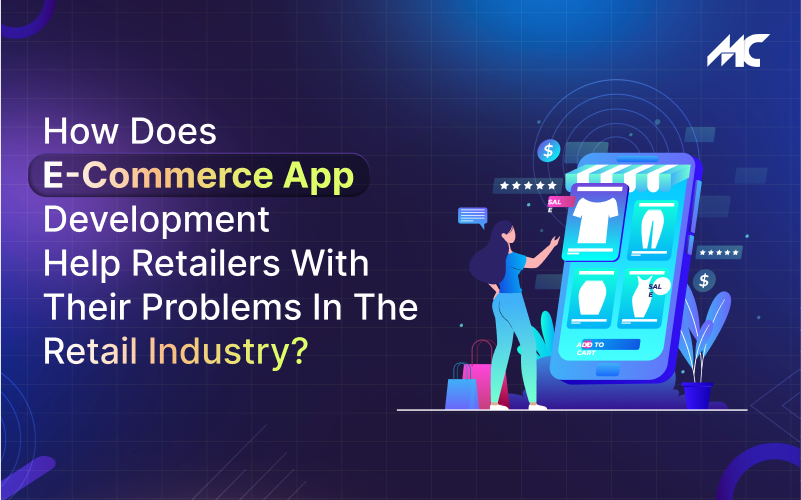How Does E-Commerce App Development Help Retailers With Their Problems in the Retail Industry?
The internet has emerged from Web 1.0 static pages into a dynamic shopping center. Retailers are facing major challenges due to the rise of the e-commerce industry. The COVID-19 global pandemic brought more woes to their existing challenges.
Consumers are also evolving with the growing demands of e-commerce development. Although the history of e-commerce goes back to the late 1960s, significant changes have occurred only in the past two decades.
We can hold the rise of the internet and the availability of smartphones, which are responsible for this m-commerce transformation worldwide. It is expected that the ecommerce market might grow to $5.4 trillion by the year 2026.
Many believe that e-commerce is reaching its peak with dynamic websites and mobile applications. However, innovative technologies like Artificial Intelligence, Virtual Reality, Augmented Reality, and Blockchain promise much more.
Traditional retailers are planning to shift over to online mediums. However, the fierce competition from big players like Amazon, eBay, and Temu is creating huge friction for newcomers.
Unique and feature-intensive e-commerce app development is the only solution to leverage market gaps. Retailers should consider online platforms to mitigate their existing challenges and expect higher ROI.
This blog is the perfect place to learn all you need to overcome the retail challenges with e-commerce app development services.
- What is E-Commerce App Development?
- Common Challenges in the Retail Sector
- The E-Commerce Transition From Websites to Applications
- E-Commerce Mobile Application Development Process
- E-Commerce App Development Trends in 2024
- E-Commerce App Development Cost
- Why You Should Consider E-Commerce App Development Services?
- How Can E-Commerce App Development Resolve the Retail Industry’s Problems?
- Different Types of E-Commerce Applications Available in the Market
- How MobileCoderz Can Save Your Retail Brand With Bespoke E-Commerce App Development Services?
What is E-Commerce App Development?
By e-commerce, we mean trading goods and services on online marketplaces. Transactions take place either in cash or electronically. E-commerce app development is the process of building mobile applications for specific platforms to help a business sell and market its products online.
An e-commerce app development process involves multiple stages and a good investment. A business has to go through strategic planning, designing, testing, and development. The story doesn’t end there, as they also need to regularly update their digital solution to stay relevant.
Almost everyone has access to mobile devices. Consumers also expect the convenience and experience of e-commerce applications from a retailer.
A business may invest in an in-house development team or outsource this task to an e-commerce development company. It is a vital step in modern commerce to improve market reach, boost sales, and enhance customer engagement.
Common Challenges in the Retail Sector
The pandemic brought major challenges for retail businesses. Operating physical stores is higher when consumers expect a digital experience and convenience. Let’s explore some of the core challenges of this industry;
Personalised Shopping Experiences
A smart retailer creates the need for a product even the consumers realize it. It helps in creating a personal touch with customers and establishes them as a credible business. However, businesses have to put extensive effort into creating this personalized shopping experience via offline channels.
They need a platform that provides endless possibilities to customize the shopper’s experience. It is only possible by considering M-commerce application development services. Retailed can showcase their products uniquely to make successful sales.
Direct-To-Consumer Model
Many brands believe in cutting the middlemen and selling products to consumers directly. In 2024, a direct-to-consumer mode will be a significant challenge for traditional retailers. Young customers are impatient with their purchase decisions.
They don’t like to spend enough time calling and visiting stores to make the purchase decision. This generation does not prefer offline shopping. It could be a major setback for your business if you are targeting young demographics.
Sustainability Practices
Rising competition is making traditional retail businesses question their sustainability. It is becoming increasingly difficult to break even and compete with brands that have online stores. The future of commerce depends on digital innovation. Traditional businesses are lacking innovation and growth without e-commerce website development.
The E-Commerce Transition From Websites to Applications
The idea of e-commerce didn’t begin recently. In fact, it has existed for over thirty years. The start of the World Wide Web was the portal to m-commerce. Most retail businesses establish their online presence through e-commerce websites.
However, the rising availability of mobile devices led to the demand for mobile applications. It was far superior to browsing and shopping for products on a web browser. Retail software development had a major role in this increasing demand throughout the 2010s.
These applications had more features, better UI/UX, robust security provisions, and fluidity than standard e-commerce websites. More businesses started adopting them as their main retail channel.
For example, Amazon has been around since the late 1990s. It was one of the first e-commerce businesses to launch its application in 2008. It first came to the Apple AppStore and was an instant hit, with millions of downloads worldwide.
Mobile applications are more useful and flexible than websites. It encourages any e-commerce businesses to consider e-commerce app development services.
E-Commerce Mobile Application Development Process
New businesses are often intimidated by the success of giants like Amazon, Shopify, and eBay. However, suitable M-commerce application development services can support retailers in embracing digital innovation.
A typical development process has the following steps;
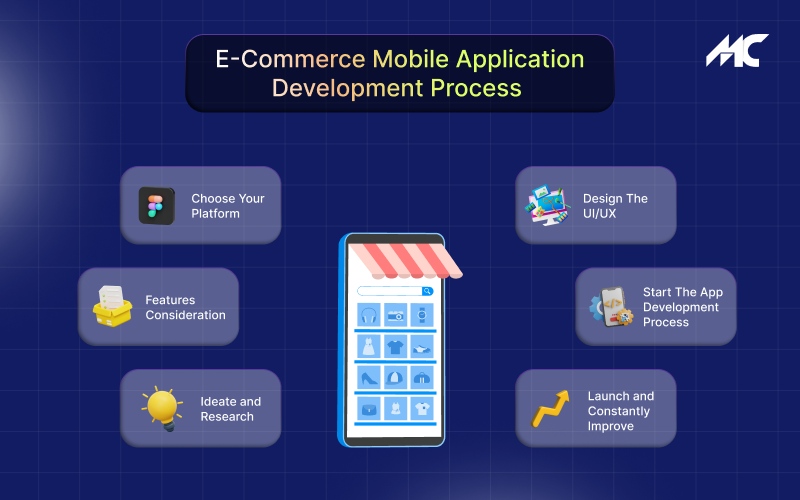

Ideate and Research
Everything begins with a plan and research. Retail businesses must dedicate enough time to brainstorming and jot down the possible ideas for a new e-commerce application. Almost every idea should be welcomed for better innovation.
Next, we are going to balance these ideas against the market realities. There are two methods of conducting strong market research;
- Potential users
- Competitors
Both these approaches give you a strong idea about the current market trends and demands. Most product strategists recommend capitalizing on the local market and then going global. However, you should consider running surveys and providing feedback to the people in your neighborhood.
At the same time, analyze your competitors’ activities. Understand their marketing and monetization strategies. This will give you a close look at the market gaps that you can leverage.
Competitor research is essential to gather insights about your target market. You can implement these insights to create a relevant e-commerce app.
Features Consideration
The next step is to define the basic features of your e-commerce application. In this stage, you must implement the findings from your market research and brainstorming. Consider developing an MVP (Minimum Viable Product) to understand the core features and how they will perform.
Focus on core functionalities like security, stability, and scalability. These fundamentals will define the overall user experience of your e-commerce app. For a smoother implementation, consider hiring a mobile app development company.
Choose Your Platform
Your preferred platform depends on your potential users and e-commerce business model. Selecting the ideal platform is essential to ensuring the application’s income.
Different countries have distinctive market shares of iOS and Android devices. For example, 1st world countries like the USA, UK, and Australia have more iOS devices. In contrast, countries like China and most South East Asian countries have more Android devices.
However, you should consider building cross-platform apps for a better market presence. Sheer customer volume is not always the answer for big businesses. For example, some luxury stores may have fewer customers, but they yield high-value purchases to keep the business profitable.
A survey shows that iOS users spend more on gadgets on average than Android users. It could be due to their higher purchase capacity. Hire iOS app developers if you are targeting high-income groups.
In contrast, hire Android app developers to get a wider market reach for mass products. Ultimately, the platform of your choice depends on your market research and business goals.
Design the UI/UX
The major focus of your development process should be on ensuring a consistent and functional UI/UX. Your target audience shouldn’t have difficulties browsing your e-commerce app.
The designing team will use various tools, such as Figma or Illustrator, to provide you with prototypes or mockups of the app design. Always prioritize the functionality and effort of funky animations.
People expect a simple yet intuitive user experience from e-commerce apps. Take help from a mobile app development company that does both design and development work. You will have the complete product ready from the same team.
Start the App Development Process
Once you have the design ready, it’s time to transform it into a fully functional e-commerce application.
The actual development process depends on the right app development tools and methodologies. A trustworthy e-commerce app development company will implement the best tools, programming languages, development frameworks, and environments.
Launch and Constantly Improve
The final step in the e-commerce app development process is an ongoing cycle. You must put continuous efforts into improving the application by learning from customer feedback and competitors.
It enables you to generate buzz, spark interest, and build anticipation for your e-commerce application. Ask your tech team to continuously monitor key app metrics such as acquired active users and average session duration. You will find innovative ways to promote your app without saturating users with an influx of marketing content.
Must Read: Are NFTs The Future Of E-commerce Industry?
E-Commerce App Development Trends in 2024
2023 was a significant milestone for the generative AI and the e-commerce industry. The online experience is getting very close to in-person shopping. These are some remarkable trends to watch for in 2024;
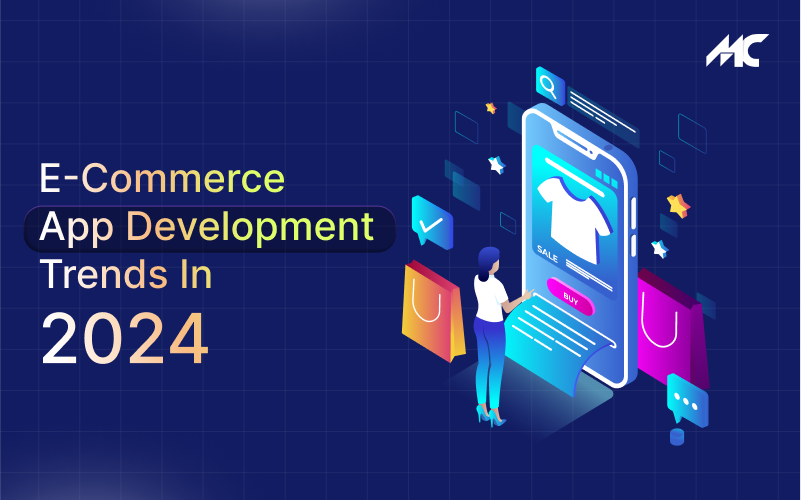

AI Chatbots
Most successful e-commerce businesses like Amazon and eBay prioritize customer support. Consumers also want to get relevant help without facing overwhelming information. Chatbot app development is necessary to create a personalized experience for customer retention.
These chatbots can save you time and money when hiring and training customer support professionals. Many brands are considering this option to provide a more fulfilling shopping experience.
Social Media Commerce
Social media platforms are excellent for word-of-mouth marketing. Many of these sites have built-in online stores for e-commerce. It is an innovative approach to attract more customers and retain them longer.
Social media app development could be a marvelous alternative approach to building an e-commerce store.
Big Data
Numbers are your best friend when you are trying to run an e-commerce business. Big data algorithms will be necessary for your e-commerce app development projects to analyze user data.
It helps in making data-driven decisions and predictions for your e-commerce company.
E-Commerce App Development Cost
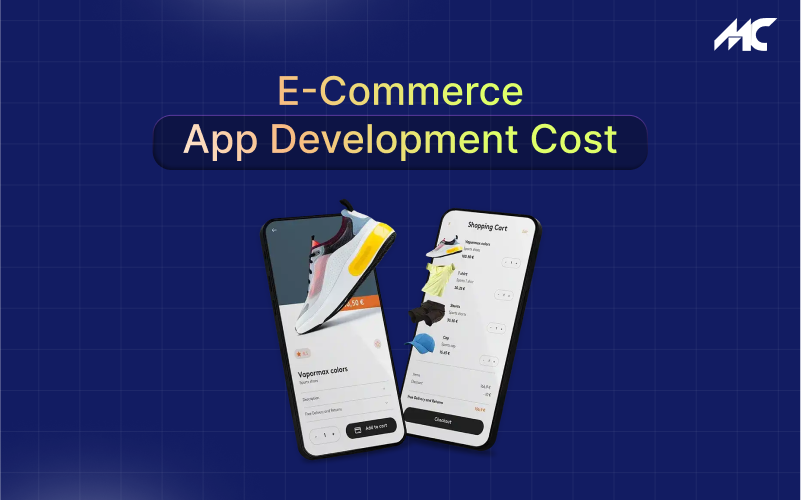

The total cost of e-commerce app development depends on your requirements and the app’s complexity. Many factors can influence this cost, such as the development approach, features, IT team location, payment systems, platforms, etc.
A simple e-commerce app project could cost $80,000. The time frame and number of people necessary for your app might also heavily impact this cost.
Why You Should Consider E-Commerce App Development Services?
Traditional retailers must understand the depth of constant challenges they are facing from e-commerce businesses. A good investment in e-commerce app development services is the only key to better customer fulfillment and business sustainability.
Smoother Adaption to Changing Consumer Demands and Behavior
The rise of the internet has led to a drastic change in consumer habits. It is becoming harder to keep up with changing consumer demands. E-commerce app development could be an effective solution to stay ahead of the curve and fulfill consumer preferences.
Accepting the change is the only way to make your company prosperous in a competitive industry. People have high expectations from any e-commerce business where they shop.
Sustainability and Eco-Friendly Initiatives
Digital applications are transforming the world with sustainable and eco-friendly practices. You can showcase your eco-friendly initiatives, such as using green product labeling and recyclable packaging.
An investment in quality e-commerce app development helps you create a positive brand perception. It highlights how your brand cares about the environment and community.
Reliable Inventory Management
Traditional businesses often have trouble managing inventory. E-commerce app development services can streamline your stocks by providing strong inventory management tools. It provides superior visibility of the inventory to avoid shortages and maintain surplus stocks.
A good integration also provides real-time notifications for quick restocking and product availability. Effective inventory management is good for both company operations and customer experience.
Also Read: What Are The Top 10 eCommerce Platforms?
How Can E-Commerce App Development Resolve the Retail Industry’s Problems?
Enhance the Overall User Experience
Every customer has certain expectations from a retailer. M-commerce development services ensure a seamless and personalized shopping experience.
Customers who visit your online store feel valued because of push notifications, custom recommendations, and easy navigation. A great overall user experience is an incubator for repeat purchases.
Boost Customer Engagement With Multiple Touchpoints
People will only remember your brand when you have enough brand awareness channels. A mobile app and website are excellent measures to introduce multiple touchpoints for your prospects and existing customers.
Consider multi-vendor app development for a strong market presence and reach to a wider audience.
Omni-Channel Integration
The future of retail depends on building smooth shopping experiences across various channels. It means traditional retailers should focus on developing physical stores, mobile apps, and websites.
Shoppers will have more flexibility when switching between any shopping channel at their convenience. For example, most smartphone brands have both retail experience stores and e-commerce portals for maximum reach.
Fulfilling The Emerging Dominance of Mobile E-Commerce
Mobile e-commerce provides better accessibility, convenience, and personalized shopping experience than any channel. Most savvy businesses are already embracing this rapid adoption. The dominance of mobile e-commerce will be there with the increasing demand for e-commerce app development services.
World-Class Personalization with Artificial Intelligence
The Artificial Intelligence (AI) revolution is also hitting almost every industry worldwide. Retailers must consider this technology in their operations to stay ahead in the game.
Consider developing an e-commerce app to analyze customer data, preferences, and behaviors. AI technology provides personalized and relevant product recommendations and targeted campaigns, which could be a game changer for most traditional retail businesses.
Streamlining Mobile Payment Solutions
Consumers often demand flexible and seamless payment solutions. M-commerce apps integrate with digital wallets and mobile payment platforms to facilitate quick and convenient purchases.
Your customers won’t need to carry any physical cash or cards. A mobile app development company will help you integrate mobile payment solutions into your app to ensure this convenience.
Digital wallets like Apple Pay, Google Wallet, and PayPal are the true torchbearers of a cashless economy.
Opening a New Portal to Augmented Reality and Virtual Reality
The physical presence of products was the main advantage of traditional physical stores. People could observe the look and feel of a product they want. However, things are changing with the introduction of AR/VR app development.
These immersive technologies enable shoppers to try and visualize products virtually from the comfort of their homes. AR and VR technologies can bridge the gap between the physical and digital worlds.
One-to-One Engagement With Customers
M-commerce applications enable you to highlight products and engage customers on a one-to-one level. E-commerce businesses evaluate their customers’ purchase history to determine which product is more relevant for them.
The review and ratings systems on mobile applications and websites provide an interactive place for consumers and e-commerce businesses.
Reduction in Operational Costs
Another advantage of considering e-commerce app development for your retail store is cost reduction. We understand that managing multiple expenses in traditional brick-and-mortar stores can become troublesome.
When you have a mobile application, you don’t need to invest in physical space, staff, electricity, or other costs. You would only need a reliable warehouse to stock your inventory for online sales.
Different Types of E-Commerce Applications Available in the Market
Companies can implement different approaches to engage their participants and ensure a cash flow.
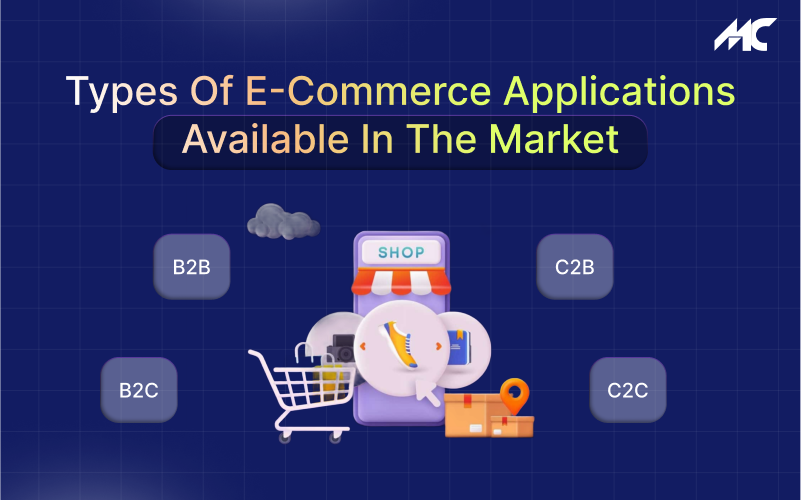

B2B
Business-to-business applications provide transactions between businesses. Many companies prefer this model by offering bulk purchasing and pricing, such as Amazon Business.
B2C
A Business-to-Consumer model provides a sales channel between a business and individual customers. It is the most common business model worldwide.
C2B
These mobile e-commerce platforms allow consumers to sell products or services to businesses. For example, Clutch enables businesses to hire agencies or individual consultants.
C2C
These mobile applications provide transactions and communication between consumers. You may consider social media app development services to implement this business model and earn from ads or listing fees.
eBay and OLX are some prominent examples of companies using this model.
How MobileCoderz Can Save Your Retail Brand With Bespoke E-Commerce App Development Services?
You cannot trust an inexperienced development team to start your project. Only a reliable and trustworthy e-commerce app development company will help you develop a quality product.
MobileCoderz is a leading, seasoned mobile app development company with years of experience in e-commerce development. We exist to help businesses and startups like yours take advantage of mobile commerce’s potential by offering cutting-edge MCommerce solutions.
Our team prioritizes.
- Scalability
- Security
- Integration
- Monetization
- User Experience
Ready to elevate your business with a top-tier e-commerce app? Contact us today to discuss your project and start building your future.
Frequently Asked Questions
How Much Time Would It Take to Develop My E-Commerce App?
The actual time frame for developing an e-commerce application depends on your project requirements. You can expect the MVP to be developed within 3 months. The final product might take 7-9 months to finish. However, advanced e-commerce solutions can take more than a year to develop.
What are The Popular Types of E-Commerce?
These are the primary types of E-commerce models;
- Business-to-Business (B2B)
- Business-to-Costumer (B2C)
- Consumer-to-Business (C2B)
- Consumer-to-Consumer (C2C)
What are the Security Risks Associated with E-Commerce Websites and Apps?
E-commerce business owners must prioritize three aspects of security;
- Confidentiality
- Integrity
- Availability
Hiring a reliable e-commerce company could be a great strategy for securing your portals and transactions. They will implement the necessary encryption methods to protect confidential data and transactions.
What are the Fundamental Aspects of E-Commerce Portals?
Multiple fundamentals are responsible for an e-commerce app’s success, including security, features, platform, design, and maintenance. You should consider e-commerce app development services to prioritize these aspects during the development stage.
-

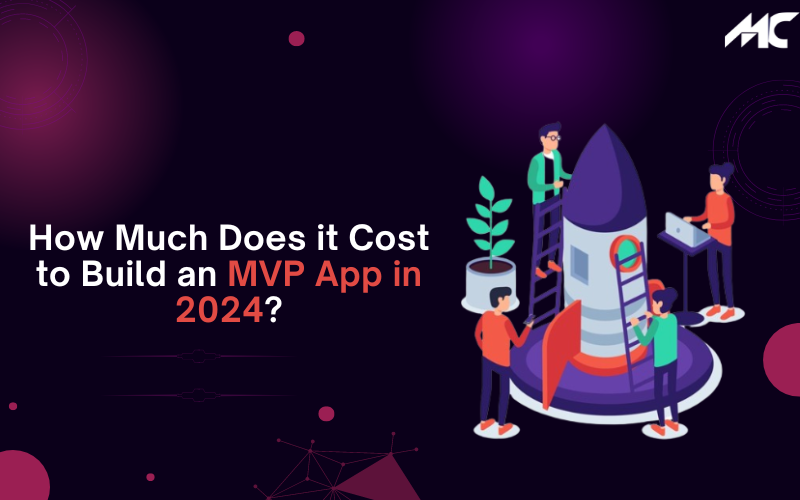 How Much Does it Cost to Build an MVP App in 2024?
How Much Does it Cost to Build an MVP App in 2024? -

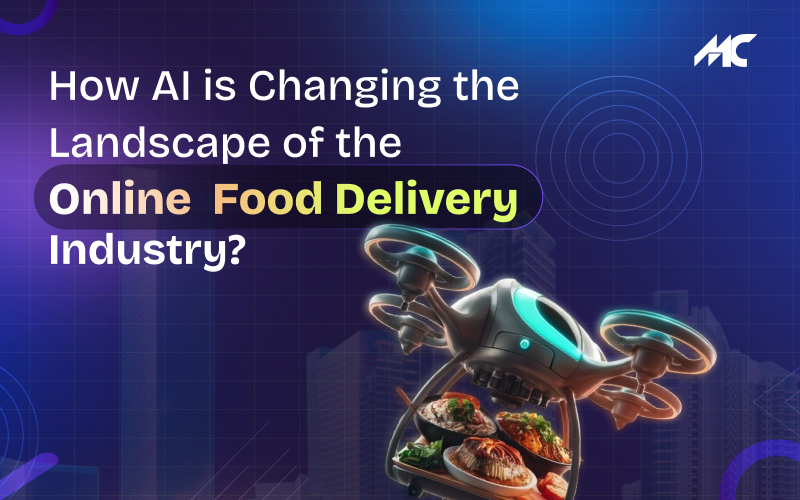 How AI is Changing the Landscape of the Online Food Delivery Industry?
How AI is Changing the Landscape of the Online Food Delivery Industry? -

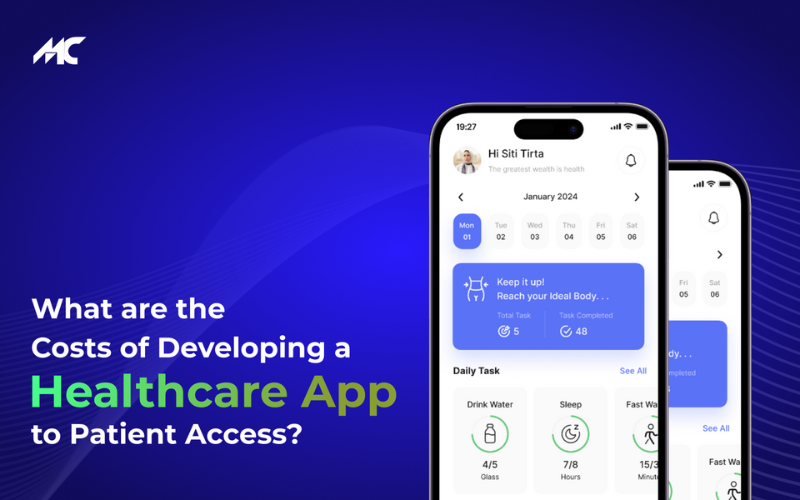 What Are the Costs of Developing a Healthcare App Similar to Patient Access?
What Are the Costs of Developing a Healthcare App Similar to Patient Access?



